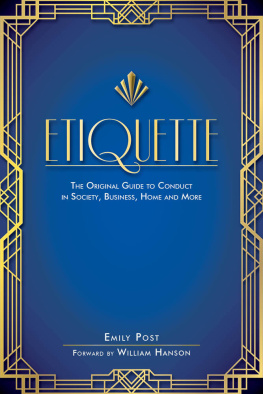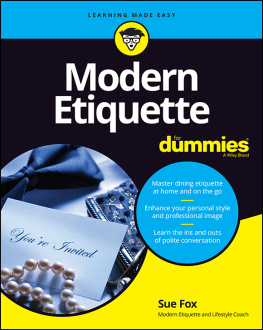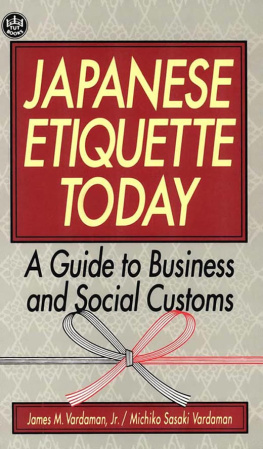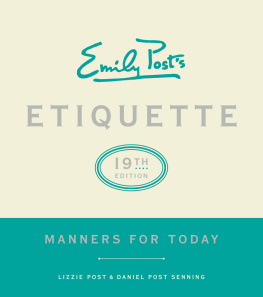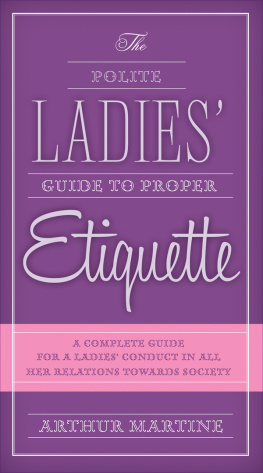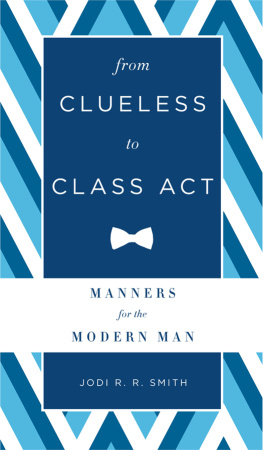

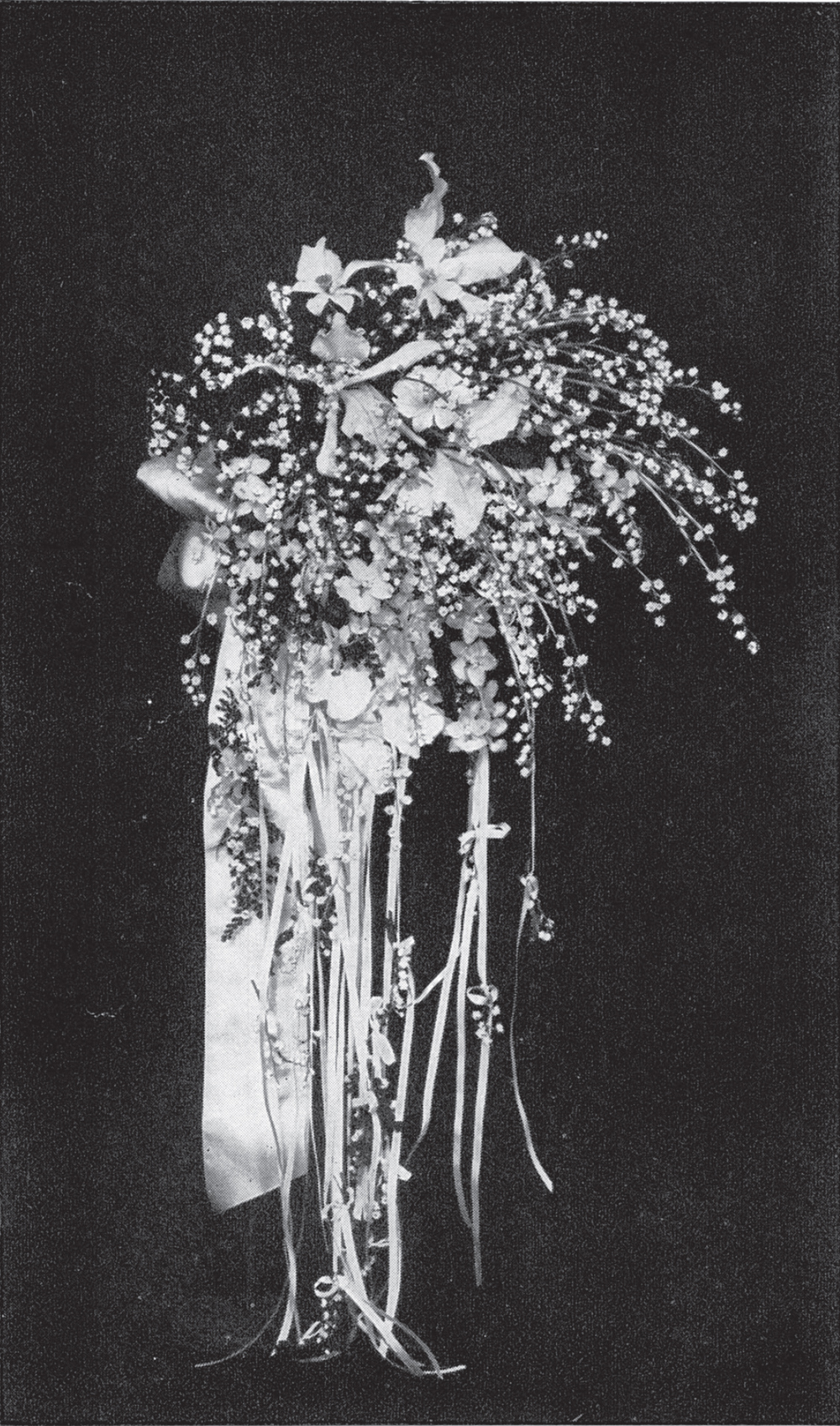
A BRIDES BOUQUET
THE RADIANCE OF A TRULY HAPPY BRIDE IS SO BEAUTIFYING THAT EVEN A PLAIN GIRL IS MADE PRETTY, AND A PRETTY ONE, DIVINE. [.]
First published in 1922 by Funk & Wagnalls Company
First Skyhorse Publishing Edition 2017
All rights to any and all materials in copyright owned by the publisher are strictly reserved by the publisher.
Foreword 2017 by William Hanson
Skyhorse Publishing books may be purchased in bulk at special discounts for sales promotion, corporate gifts, fund-raising, or educational purposes. Special editions can also be created to specifications. For details, contact the Special Sales Department, Skyhorse Publishing, 307 West 36th Street, 11th Floor, New York, NY 10018 or .
Skyhorse and Skyhorse Publishing are registered trademarks of
Skyhorse Publishing, Inc., a Delaware corporation.
Visit our website at www.skyhorsepublishing.com.
10 9 8 7 6 5 4 3 2 1
Library of Congress Cataloging-in-Publication Data is available on file.
Cover design by Michael Short
Print ISBN: 978-1-5107-2339-9
Ebook ISBN: 978-1-5107-2340-5
Printed in the United States of America
TO YOU MY FRIENDS
WHOSE IDENTITY IN THESE PAGES
IS VEILED IN FICTIONAL DISGUISE
IT IS BUT FITTING THAT
I DEDICATE THIS BOOK.
CONTENTS
PHOTOGRAPHIC ILLUSTRATIONS
FOREWORD
There are more etiquette books published than people realize. But for many Emily Posts initial offering remains a particularly glittering jewel in the crownand with good reason.
Emily Post realized that manners and etiquette are not just applicable to a countrys upper class, an elite or an out of touch few. Manners are (and should be) accessibleageless, timeless, classless, and priceless.
The Best Society is not a fellowship of the wealthy, she writes in her first chapter. Nor does it seek to exclude those who are not of exalted birth; but it is an association of gentle-folk.
For some, such proclamations would not have gone down well. There wereand still arethose who believe it sacrilegious to spread the gospel of the done thing to the masses, in fear it will get watered down and the delicate perch in which the insecure elite place themselves may begin to get lower and lower.
The British novelist and journalist Nancy Mitford faced much the same backlash in 1956 when she released her short study identifying the vocal sociolect of the English upper classes, who for years had knowingly selected certain words over other synonymous words in order to distinguish themselves from the proletariat.
Emily Post was fairly progressive and enterprising. Although born into and initially married to money she did not rely on that and went against the advice that well-bred women should not work; she wasnt afraid to forge her own path and create her own prosperity, especially after she divorced her husband in 1905 after his string of affairs with chorus girls and actresses. Then came a series of novels and serials for notable magazines before the masterpiece.
When Etiquette in Society, in Business, in Politics, and at Home was first published in 1922, America was (as it still is) a melting pot of nationalities and culture and home to much first-generation wealth. Emily Posts tell-all tome revealed what money couldnt buyclass. Using a light-hearted and never preachy tone throughout, coupled with reoccurring caricature families, such as the Toploftys, Richan Vulgarians, and the Eminents, she managed to disseminate must-know tips and tricks in order to gain a more civilized life, whatever a persons heritage.
On the face of it, the world has changed considerably since the book arrived in the 1920s. It was a world free from hashtags, selfies, reality television, and the paramecia that it creates.
How would Emily Post handle a dinner guest arriving and demanding the Wi-Fi password before their host has even been able to pour them a drink? What would she say to some of the sights we see annually arriving at the Met Ball? Would she approve of the modern rules of courtship?
Its hard to imagine Emily Post vacillating as to which Instagram filter made her candelabra-clad dinner table look the most shareable. Would Juno be too much? How about X-Pro II? Does Lark wash out the napkins?
Its not a mental image that sits comfortably with me.
But whilst shed have undoubtedly had a few things to say, I doubt Emily Post wouldve been as horrified as many may thinkshe was certainly no American replica of Maggie Smiths dowager Countess in the hit TV drama Downton Abbey.
That said, in only her second chapter she pinpoints New Yorks bad mannerswhich, if they were bad in 1922, heaven only knows if she and her more civilized contemporaries would cope in the twenty-first century-incarnation of the Big Apple.
Her name is now synonymous in America with correct entertaining. She was a woman who trail-blazed and cleared the previously whiskey-soaked, mannish path ready for people like Nancy Astor, Ina Garten, and Martha Stewart to followall four unashamedly embracing their femininity with confidence.
(Incidentally, Emily Post is one of those rare people with whom it is neigh-on impossible to call by anything other than both their names, like Mary Poppins. To say Mrs. Post makes her sound like a genial provincial prep school teacher; to call her Emily (when none of us knew her personally) is an over-familiarity that she wouldnt have condonedalthough, naturally, for which she wouldnt have admonished us.)
Her book has now been renamed to just Etiquette and has been updated and rewritten countless times by her descendants. But however many new popular culture references, or technological updates are made, it is always essentially the same book with the same message as the original.
Much of what Emily Post originally wrote is still applicable today. Granted, the art of the formal letter has been replaced by emails, texts, and Whatsapp, and invitations now come electronically through Facebook rather than stiff cards through the mail, so those chapters are now amusing vignettes on an almost by-gone era. The introductions, conversation, dress, dining, and rites of passage, however, are still as relevant today as they were then.
Any wannabe student of the finer points of civility should start with Emily Posts Etiquette. One could argue they need very few other books after that, but of course no one can know everything, so further reading is neededbut it will soon be apparent that writers of etiquette books since 1922 have taken much inspiration (and in some cases borderline copied) from Emily Post, which I am sure she would find very flattering, if a little annoying.
Not only did Emily Post write one of the definitive handbooks on the subject, but she set the tone for everyone those reading, writing, and digesting similar works.
Manners are there to include, not exclude. They make life easier. And now, more than ever, in our fast-paced, selfish, and unforgiving world, we all need to read and re-read what she originally said.
Ill give her the final word. Rules of etiquette are nothing more than the signposts by which we are guided to the goal of good taste.
William Hanson
INTRODUCTION
MANNERS AND MORALS
Next page
